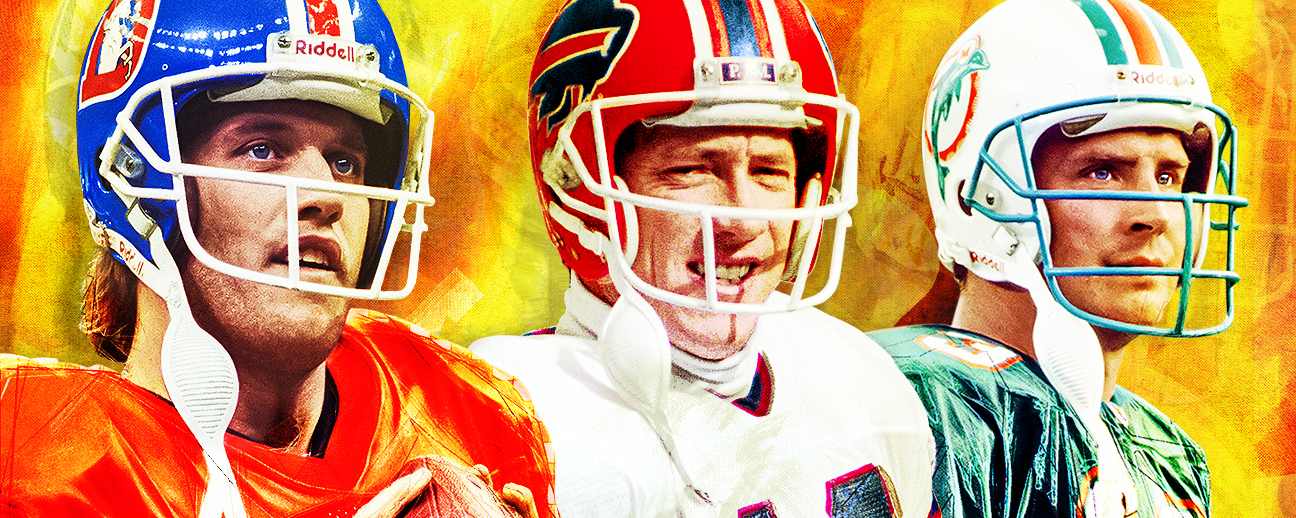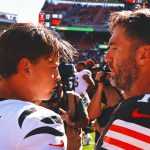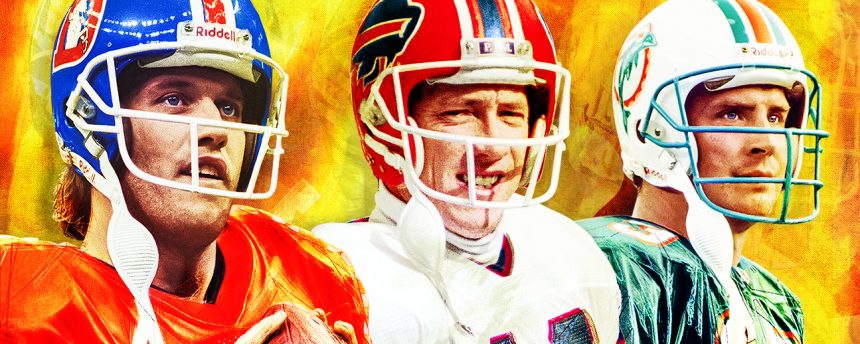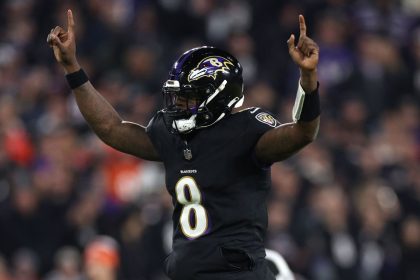
IT HAS BEEN four decades since the future at the most important position in sports arrived in the NFL.
Forty years since an NFL-record six quarterbacks were selected in Round 1: John Elway (No 1 overall), Todd Blackledge (7), Jim Kelly (14) , Tony Eason (15), Ken O’Brien (24) and Dan Marino (27). It was a transformational class led by three — Elway with the Denver Broncos, Marino with the Miami Dolphins and Kelly with the Buffalo Bills — who were first-ballot Hall of Famers and were at the forefront of the league’s evolution toward high-flying passing offenses.
“Those guys — Dan, John, especially Dan in the way he was immediately just letting it loose — pushed it forward,” Hall of Famer Peyton Manning said earlier this season. “I mean what Dan was doing, especially, right away, 48 touchdowns in his second year, remarkable achievement in that time when everything was so different — the attitudes, you could hold the receivers, all of those things …
“It took 20 years for some of those records to be broken. How people think about quarterback, how it’s played, how it looks — there is a big piece of it that is from those guys.”
The Broncos (3-5) face the Bills (5-4) on Monday night in Highmark Stadium (8:15 p.m. ET, ABC/ESPN) in the 41st meeting between the former AFL rivals. It will feature two quarterbacks in Denver’s Russell Wilson and Buffalo’s Josh Allen who have built their careers in the pass-happy NFL that Elway, Marino and Kelly helped establish.
The trio had nine Super Bowl trips among them, two Super Bowl wins — both Elway’s — on their way to becoming both rivals and lifelong friends.
MARINO, ELWAY AND Kelly might not have been able to thrive in the 1980s without innovative coaches who embraced pass-heavy attacks in the late 1970s. Don Coryell began to challenge the establish-the-run standard with Hall of Fame quarterback Dan Fouts with the San Diego Chargers.
Hall of Fame coach Bill Walsh’s arrival in San Francisco in 1979 with the West Coast offense was a significant domino as well. The offense included some passing plays Walsh believed could be substituted for runs and set up big shots down the field.
And in 1983, the six-quarterback first round seemed to provide proof of where the game was going.
“In a lot of ways I do think that (’83) group forced everybody to look at things,” said Mike Shanahan, who had two different stints as a Broncos assistant coach during Elway’s career before returning to the Broncos as head coach in 1995. “Not just what having a quarterback like that could do for your team, for your organization, but how it was changing how we played the game, how we thought the pass and run could fit together.”
Just 10 years before that class was drafted, teams averaged 281.9 combined passing yards per game in 1973. In 1983, that number jumped to 409.3 combined yards. It has continued to climb, reaching 440.3 combined yards per game in 2022.
Four-thousand-yard passing seasons, once a rare benchmark, became a regular occurrence during the 1980s. Fouts had the NFL’s first in 1979. There’s been at least one nearly every season since, with 12 quarterbacks reaching that mark in both 2018 and 2020.
The Class of ’83 quarterbacks were often among the most prolific passers during their careers. Those six first-rounders combined to finish a season in the top five in passing 21 times — with Marino leading the way. He finished No. 1 in passing five times and placed in the top five 11 times during his career. He also had the league’s first 5,000-yard season in 1984.
There wasn’t another 5,000-yard season for 24 years until former New Orleans Saints quarterback Drew Brees in 2008. Since then, seven other quarterbacks have had at least one, with the Kansas City Chiefs’ Patrick Mahomes being the latest in 2022.
“No question in my mind,” Shanahan said, “you watch what Dan did, what John did, what Jim did, how they did it, how quickly they did it in their careers influenced how offenses are doing what they’re doing these days.”
ELWAY, WHO PLAYED high school football in California and went on to Stanford, said he didn’t meet Kelly until they were both in the NFL. His first introduction to Marino was when both players were being vetted before their senior seasons in college as two of the potential front-runners for the Heisman trophy.
“ABC did this college football tour, probably more of a college football tour rather than a Heisman tour or anything, but it was me, Danny, Dave Rimington, Billy Ray Smith, Kelvin Bryant, I think,” Elway said. “We were all together for about a week and went to about six or seven cities.
“Back then it was much more difficult to see other players who maybe weren’t in your conference, or in your part of the country … just because it was such a different time.”
Marino and Kelly, both western Pennsylvania natives, had first met as counselors at Steelers great Jack Lambert’s football camp when Kelly was at the University of Miami and Marino at Pittsburgh.
After initially bypassing the NFL for two seasons to play with the upstart USFL, Kelly signed with the Bills in 1986, who held his draft rights.
By then, Elway had been to the playoffs twice and Marino had already played in a Super Bowl. In his second season, as a 23-year-old, set loose by coach Don Shula, Marino set the record for most passing yards in a season (5,084) and threw for an NFL-record 48 touchdowns.
Marino’s passing yardage record stood until 2011, and the touchdown record stood until 2004. Marino had four of his six career 4,000-yard passing seasons before 1989. There were only 10 other 4,000-yard passing seasons in the league’s history, other than Marino’s, before that year.
Kelly quickly grew into the linchpin of the Bills’ K-Gun offense, often in no-huddle looks with Kelly handling things at the line of scrimmage. The Bills became an AFC playoff staple and reeled off four consecutive Super Bowl appearances. Kelly’s Bills won all three playoff meetings against Marino and the Dolphins.
“You watched what Danny was doing with Shula in the ’80s and how Jimmy was kind of that first piece in Buffalo … Danny was throwing the ball down the field it seemed like all the time, then Jim is in that K-Gun, doing so much at the line of scrimmage, so much freedom to get them into things, get people in the right spot, spread things out a bit,” Elway said. “So hell yeah, I thought about how they got to throw it — a lot.”
As division rivals, Marino and Kelly were in each other’s way plenty. They had 18 regular-season meetings to go with those three in the playoffs — and Elway said he could often only marvel from afar. Elway waited until 1995 — his 13th NFL season — and the arrival of coach Mike Shanahan before he would reel off all three of his career seasons with at least 26 touchdown passes (in his final four seasons) to go with two Super Bowl wins in his last two years in the league.
Elway faced Marino’s Dolphins three times, including the Broncos’ divisional win on the way to the second Super Bowl victory, and faced Kelly and the Bills six times.
“The rivalry is the competitiveness, just wanting to win,” Marino said. “Then the friendship and camaraderie between the guys — it’s always been there for me with John and Jim … mutual respect, love for the game, all that … You’re happy for them, but at the same time, you want to kick their ass. Unless you’re not a competitor, which, I feel like I was a highly competitive person.”
Golf became an annual connector as they each moved through careers. Elway, Marino and Kelly each had an offseason golf tournament, and the three would play in them in addition to tournaments hosted by other players.
“You’re happy for them but at the same time, you want to kick their ass.” Dan Marino on the competitive relationship with John Elway and Jim Kelly
“And that was a big part of our closeness,” Kelly said. “John had his golf tournament. I had mine, Boomer [Esiason] had his, Bernie Kosar. I can go on and on. You come to mine, I’ll go to yours. And that back in the day was so much fun. We had a blast … It was, you know, having fun, and we knew not only we’re going to get a chance to meet each other and get to know each other.”
KELLY’S CANCER DIAGNOSIS — he was first diagnosed with squamous cell carcinoma in his upper jaw in 2013 — and long battle, including multiple surgeries, rounds of radiation as well as chemo and a reconstruction of his jaw, in the years since have moved the three’s bond way beyond football.
“You’re playing against each other, you’re doing the same thing, you have mutual respect for your job, your team, the things you do,” Marino said. “And then Jim, just like a lot of us as life goes on, you go through a lot of different things. He went through a lot … and then battling cancer. He’s awesome. [I have] the most respect in the world for what he’s been through. and what he’s like as a person. [But] I love those guys, man. We’ve been through a lot of the same stuff in life and that carries, you know? That goes a long way.”
Elway and Marino were there in July 2018 to present Kelly with the Jimmy V award at the ESPYS when an emotional Kelly told the crowd “make a difference today for someone who is fighting for their tomorrow.”
“Even though we don’t get a chance to see each other all the time, but first thing you see each other, we just give hugs and hug everybody,” Kelly said. “And then you start talking about the good old days.”
Marino has been a special adviser with the Dolphins since 2014 and had a long stint, over a decade, on CBS’ “NFL Today” pregame show before that. Dolphins quarterback Tua Tagovailoa has said Marino has spent time in the team’s quarterback meetings since Tagovailoa was selected in the first round of the 2020 draft.
Elway was a co-owner and CEO of an Arena Football League team in Denver (2003-08) after his playing career ended and was hired by Broncos owner Pat Bowlen in 2011 to be the Broncos’ chief football decision-maker. The team won five consecutive AFC West titles between 2011 and 2015, and won 50 games in a four-year span after he signed quarterback Manning in free agency to go with a Super Bowl 50 win to close out the 2015 season.
The 2013 Broncos, using some of the runway the three had put down years before, set the league’s single-season scoring record with 606 points as Manning set records for passing touchdowns (55) and passing yards (5,477).
“I always felt like our relationship was great off the field because we had a lot of common experiences that come with the job and the ups and downs with it,” Elway said. “Obviously it was tremendously competitive on the field because I just think that’s how each of us was and we knew it (laughs) … They’re great, great people.”
THE RECORD OF six quarterbacks being picked in the first round of the NFL draft still stands — even with all of the quarterbacks selected in all of the drafts over the past four decades, even as the desperate demand across the league to find others like them seemingly grows every April.
Perhaps the most impressive aspect of the draft class is that it had six first-ballot Hall of Famers — twice as many as the next-closest draft classes (six draft classes had three players get in on the first ballot). Aside from Elway, Kelly and Marino in that ’83 class, OT Bruce Matthews, CB Darrell Green and RB Eric Dickerson also got in on the first ballot.
“I never dreamed about the Hall of Fame … I grew up, you looked at, you know, guys like Roger Staubach and Terry Bradshaw, Joe Namath,” Kelly said. “That’s guys you dreamt about, not guys you ever think you’d be joining in (the) Hall of Fame.”
A quarter of the then 28 opening-round picks ended up in Canton, making that opening round unlike any other of the modern draft era.
“It really is something so unique, I mean there were six of us (quarterbacks) in that draft class and you had guys in the Hall of Fame like Eric Dickerson, Bruce Matthews and what, Darrell Green too, all in that first round,” Elway said. “Having spent plenty of time in those draft rooms, stacking the boards, I’m not sure you’re going to see too many draft classes like that one. But between me, Jimmy and Danny, I’ll always feel special being in a group with them.”









